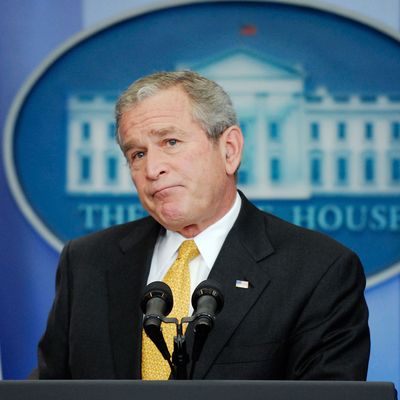
While every credible political observer is aware of the opportunity Republicans now enjoy thanks to their “trifecta” control of the White House and both chambers of Congress in 2017, it’s not always appreciated how rare it is. Paul Starr supplies the historical context:
During the past 74 years, Republicans have controlled both Congress and the presidency for only six years (1953–1954, January–May 2001, and 2003–2006). Republicans now have their biggest opportunity since before the New Deal to consolidate a regime of their own making.
The Eisenhower precedent in the early 1950s is not especially instructive. Ike’s ideological interests were so limited that Barry Goldwater accurately accused him of propagating “a dime-store New Deal,” and the GOP quickly lost control of Congress in any event.
But the George W. Bush administration offers all sorts of recent evidence about how to profit from and squander a trifecta.
An incoming administration with this kind of power can go two different ways: using it to the hilt to achieve enduring ideological goals at the risk of losing popularity, or using it judiciously to expand the party’s base.
W.’s administration, despite the incredibly controversial nature of its claim on the White House, did not begin with much humility or ideological moderation. Its first policy thrust was to fight for a huge upper-income-targeted tax cut. While that cut was enacted after some adjustments to win Democratic Senate votes, the prevailing atmosphere of ideological warfare cost Republicans control of the Senate almost immediately as Jim Jeffords switched parties. It looked at the time like the newly ascendent conservative Republicans had been taken down a peg. Then came 9/11, and an enormous accretion of popularity for Bush, which he largely used to pursue the ideologically tinged wars in Afghanistan and Iraq that eventually did so much to erode Republican power.
On the domestic front, however, Bush’s top political adviser, Karl Rove, directed a highly strategic effort to expand the GOP base via targeted policies aimed at seniors (the Medicare prescription-drug benefit), women with kids (the No Child Left Behind education initiative), and Latinos (comprehensive immigration reform). The whole mix was enough to get Bush narrowly reelected in the first presidential year after 9/11. But he went for ideological gold again with a proposal to partially privatize Social Security that backfired spectacularly. The rest of his second term was dominated by growing pubic dissatisfaction with the Iraq War, a sluggish economy drifting toward catastrophe, and big management/public relations mistakes like the handling of Hurricane Katrina. In the background, moreover, Rove’s outreach agenda produced a growing backlash from conservatives, who did not appreciate the political attractiveness of “amnesty,” a “new health care entitlement” or “federal interference with local control of schools.”
By the time Bush left office, about the only policy legacy conservatives took special pride in was the tax cuts. And the conservative backlash to his heresies eventually manifested itself in the rise of the Tea Party Movement and a general radicalization of a frustrated right-wing-dominated GOP.
What are the lessons for today’s GOP as it looks forward to using or abusing its trifecta? Probably that party unity is critical, ideological overreach is dangerous, and foreign-policy hubris can be deadly — nearly as deadly as ignoring signs of a housing bubble and an impending financial collapse. But the problem Republicans face now isn’t congressional RINOs like Jeffords or a too-clever-by-half “Mayberry Machiavelli” like Rove. It’s the figure supposedly at the wheel, the incoming president of the United States.
Trump and his closest associates have sometimes exhibited a deep interest in achieving big — or to use his language, “huge” — ideological goals. But it is not clear the ideology in question is conventional conservatism. They’ve also eagerly shown they want to use their power to build political support for the GOP. But that may be at the cost of deposing the Republican “Establishment” and turning the GOP into a cult of personality revolving around the Boss. As for the foreign adventures and economic malfeasance that brought down George W. Bush and wasted his trifecta, it is absolutely anybody’s guess what might happen in the next four years.
What should make the whole situation alarming to Republicans is that for all their chest-beating about their party being stronger than it has been since the Coolidge administration, they know they are one really bad midterm away from the situation they were in during the last two years of the second Bush administration. They should remember that not long before he became a figure of ridicule, W. was being hailed as the Liberator of Iraq, the savior of the conservative movement, and a world-historical figure standing astride a supine world like a colossus. Are they really sure Donald J. Trump will succeed where Bush failed, and for that matter, will not stab them in the back and leave them behind? If so, they truly are the Party of Faith.






























